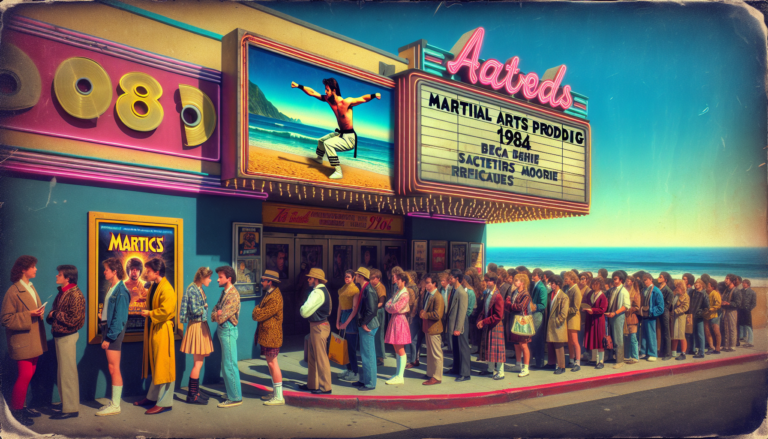When Did Karate Kid Come Out?
The iconic martial arts drama film The Karate Kid, which captured the hearts of audiences worldwide, made its debut in 1984. Directed by John G. Avildsen and written by Robert Mark Kamen, this coming-of-age story follows the journey of a young boy named Daniel LaRusso as he learns the art of karate and navigates the challenges of adolescence.
With its compelling storyline, memorable characters, and thrilling action sequences, The Karate Kid quickly became a cultural phenomenon, leaving an indelible mark on the world of cinema and popular culture.
The Karate Kid Release Date
The Karate Kid officially premiered on June 22, 1984, in the United States. The film was distributed by Columbia Pictures and garnered immediate attention from audiences and critics alike.
The movie’s release date coincided with the start of the summer movie season, a strategic move that helped it gain significant traction at the box office. The Karate Kid’s blend of action, drama, and heartwarming moments resonated with viewers of all ages, contributing to its commercial success and enduring legacy.
International Release Dates
Following its successful launch in the United States, The Karate Kid made its way to international markets, captivating audiences across the globe. Here are some notable international release dates:
- Canada: June 22, 1984
- United Kingdom: August 31, 1984
- France: September 26, 1984
The film’s universal themes of perseverance, friendship, and personal growth transcended cultural boundaries, making it a beloved classic in countries far and wide.
The History of The Karate Kid
Development and Production
The Karate Kid’s journey from script to screen began with writer Robert Mark Kamen, who drew inspiration from his own experiences learning martial arts. Director John G. Avildsen, known for his work on the Oscar-winning film Rocky, was drawn to the project’s themes of underdog triumph and personal transformation.
With a talented cast led by Ralph Macchio as Daniel LaRusso and Pat Morita as Mr. Miyagi, the film’s production commenced, bringing together a team of skilled martial artists, choreographers, and cinematographers to create the movie’s iconic fight scenes and training sequences.
Plot Summary
The Karate Kid tells the story of Daniel LaRusso, a 17-year-old boy who moves from New Jersey to Los Angeles with his mother. Struggling to find his place in a new city, Daniel becomes the target of a group of bullies led by Johnny Lawrence, a skilled karate student from the Cobra Kai dojo.
Seeking to defend himself, Daniel turns to Mr. Miyagi, a wise and enigmatic maintenance man who agrees to teach him the art of karate. Through unconventional training methods and life lessons, Mr. Miyagi helps Daniel develop not only his martial arts skills but also his confidence and inner strength.
The film culminates in a dramatic showdown at the All-Valley Karate Championship Tournament, where Daniel faces off against his tormentors and puts his newfound karate abilities to the ultimate test.
Main Cast and Characters
The Karate Kid boasts a talented ensemble cast that brought the film’s characters to life:
- Ralph Macchio as Daniel LaRusso: The protagonist, a teenager who learns karate to stand up to his bullies.
- Pat Morita as Mr. Miyagi: Daniel’s karate mentor, a wise and skillful martial arts master.
- Elisabeth Shue as Ali Mills: Daniel’s love interest and a supportive friend.
- William Zabka as Johnny Lawrence: Daniel’s main rival and the top student of the Cobra Kai dojo.
- Martin Kove as John Kreese: The ruthless sensei of the Cobra Kai dojo and Johnny’s instructor.
These characters and their relationships form the heart of The Karate Kid’s narrative, driving the film’s emotional core and themes of personal growth, resilience, and the power of mentorship.
Cultural Impact of The Karate Kid
Critical Reception and Awards
Upon its release, The Karate Kid garnered widespread critical acclaim for its engaging storyline, memorable performances, and thrilling martial arts sequences. The film’s success extended beyond the box office, as it received recognition at various award ceremonies.
The Karate Kid was nominated for an Academy Award for Best Supporting Actor (Pat Morita), highlighting the film’s acting prowess. It also received nominations and wins at other prestigious events, such as the Golden Globe Awards and the Young Artist Awards.
Legacy and Influence
The Karate Kid’s impact on popular culture cannot be overstated. The film’s iconic scenes, quotes, and characters have become ingrained in the collective consciousness, inspiring countless references, parodies, and homages across various media.
The movie’s success also sparked a renewed interest in martial arts, particularly karate, among young audiences. Dojos across the country experienced a surge in enrollment, as aspiring students sought to emulate the discipline and skills demonstrated by Daniel and Mr. Miyagi.
Moreover, The Karate Kid’s themes of standing up to bullies, finding inner strength, and the importance of mentorship have resonated with generations of viewers, making it a timeless classic that continues to inspire and entertain.
Sequels and Remakes
The Karate Kid Sequels
The Karate Kid’s popularity led to the creation of several sequels, extending the franchise and further exploring the characters’ journeys:
- The Karate Kid Part II (1986): Daniel and Mr. Miyagi travel to Okinawa, Japan, where they confront past rivalries and new challenges.
- The Karate Kid Part III (1989): Daniel faces a new adversary as he prepares to defend his title at the All-Valley Karate Championship.
- The Next Karate Kid (1994): Mr. Miyagi takes on a new student, Julie Pierce, played by Hilary Swank.
These sequels expanded the Karate Kid universe, introducing new characters, locations, and themes while maintaining the core elements that made the original film so beloved.
The 2010 Remake
In 2010, a remake of The Karate Kid was released, starring Jaden Smith as Dre Parker and Jackie Chan as Mr. Han. While the remake shared the same basic premise as the original, it updated the setting to China and incorporated elements of kung fu into the martial arts training.
The 2010 version introduced the story to a new generation of viewers, showcasing the enduring appeal of the underdog narrative and the student-mentor relationship that lies at the heart of The Karate Kid franchise.
The Karate Kid’s release in 1984 marked the beginning of a cultural phenomenon that continues to captivate audiences to this day. Through its compelling characters, timeless themes, and unforgettable moments, the film has secured its place as a beloved classic in the annals of cinema history.






